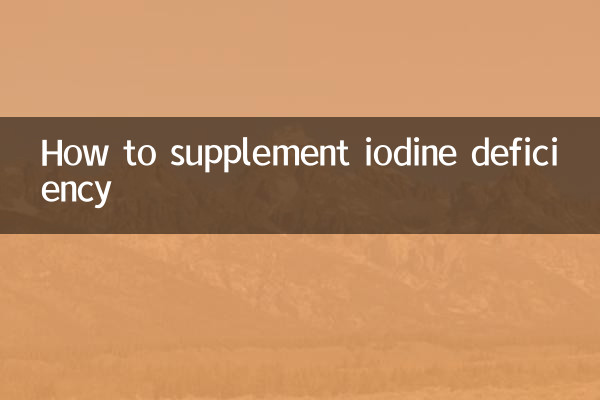Title: How to supplement iodine deficiency? Complete guide to scientific iodine supplementation
In recent years, with the improvement of health awareness, the problem of iodine deficiency has once again become a hot topic of public concern. Iodine is an essential trace element for the human body, and its deficiency may lead to thyroid disease, mental retardation and other problems. This article will combine hot topics and data from the entire Internet in the past 10 days to provide you with scientific solutions for iodine supplementation.
1. The dangers of iodine deficiency

Iodine is a key component in thyroid hormone synthesis. Long-term iodine deficiency can lead to the following problems:
| Symptoms | Influence people |
|---|---|
| Enlarged thyroid (big neck disease) | adults and children |
| mental retardation | Pregnant women and infants |
| Decreased immunity | all groups |
2. How to judge whether there is iodine deficiency?
You can preliminarily judge whether iodine intake is sufficient by the following methods:
| Detection method | Description |
|---|---|
| Urine iodine test | The most accurate testing method needs to be completed by the hospital |
| Thyroid function test | Testing thyroid hormone levels through blood |
| Daily symptom observation | Such as fatigue, hair loss, cold sensitivity, etc. may be symptoms of iodine deficiency |
3. 6 ways to scientifically supplement iodine
According to the World Health Organization (WHO) recommendations, the daily iodine intake for adults is 150 micrograms, and pregnant and lactating women need to increase it to 250 micrograms. The following are effective ways to supplement iodine:
| Iodine supplementation method | Recommended foods/methods | Iodine content (per 100 grams) |
|---|---|---|
| seafood | Kelp, seaweed, sea fish | About 10,000 micrograms of kelp |
| iodized salt | Commercially available iodized salt | About 25 micrograms/g |
| Eggs and milk | eggs, milk | Egg about 25 micrograms |
| supplements | Potassium iodide tablets (doctor's guidance required) | Adjust according to dosage |
4. Precautions for iodine supplementation
1.Avoid excessive iodine supplementation: Excessive intake may cause hyperthyroidism or thyroiditis.
2.Special groups need to be cautious: Pregnant women and patients with thyroid disease should supplement iodine under the guidance of a doctor.
3.Be careful when storing iodized salt: Avoid direct sunlight to prevent iodine from volatilizing.
5. Answers to recent popular iodine supplement questions
1.Question: How can vegetarians supplement iodine?
Answer: It can be solved by adding iodized salt, seaweed food or supplements.
2.Q: Do children need additional iodine supplements?
Answer: Generally, no additional supplement is required unless a doctor confirms iodine deficiency.
Summary
Scientific iodine supplementation is the key to preventing iodine deficiency diseases. With a sensible diet and appropriate use of iodized salt, most people can meet their daily needs. If you have any doubts, it is recommended to consult a professional doctor or nutritionist.

check the details

check the details